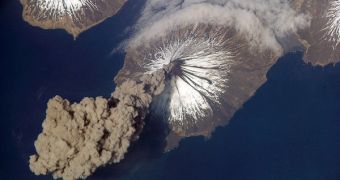Geologists warn that scientific understanding of the correlations that may exist between global warming and intense volcanic activities are very poorly understood, if at all. One possible connection, they say, could be that higher levels of carbon dioxide (CO2) in the atmosphere will melt ice caps, including those atop active volcanoes. The unstable lava spewers could therefore erupt at any time afterwards, but precisely when and how strong are things no one knows, Nature News informs.
“The fact is we are causing future contemporary climate change. [Geological hazards are] another portfolio of things we haven't thought of,” University College London (UCL) Aon Benfield Hazard Research Center expert Bill McGuire says. He was the organizer of a meeting held between September 15-17 at the university, in which volcanologists and oceanographers participated. The goal of the conference was to raise awareness on the situation, and also to try to find possible answers.
Speaking at the meeting, University of Oxford volcano expert David Pyle said that there were no models to anticipate the influence that a warming world would have on geological activities at the moment. This had been identified as an area that needed immediate remedy, participants agreed. Full simulations at a planetary scale need to be conducted on this issue, before scientific talks can progress any further. “The complex consequences of volcanic activity for the atmospheric biosphere remain poorly understood,” Pyle argued in his speech.
Lancaster University expert Hugh Tuffen believes that there is a direct correlation between less ice and more intense volcanic activity. “As thick ice is getting thinner, there may be an increase in the explosiveness of eruptions,” he said. The situation was made even worse by the fact that not all volcanoes were the same, and therefore each would act differently to climate change, the expert also added. “We still don't really know what the threat over the next 100 years will be. I don't think we should be scaremongering, we should be thinking about hazard mitigation,” he said.
“The IPCC [Intergovernmental Panel on Climate Change] hasn't addressed these kinds of hazard[s]. You have a better chance of coping with any kind of hazard if you know it's happening. Climate change is not just the atmosphere and hydrosphere; it's the geosphere as well,” McGuire agreed.

 14 DAY TRIAL //
14 DAY TRIAL //